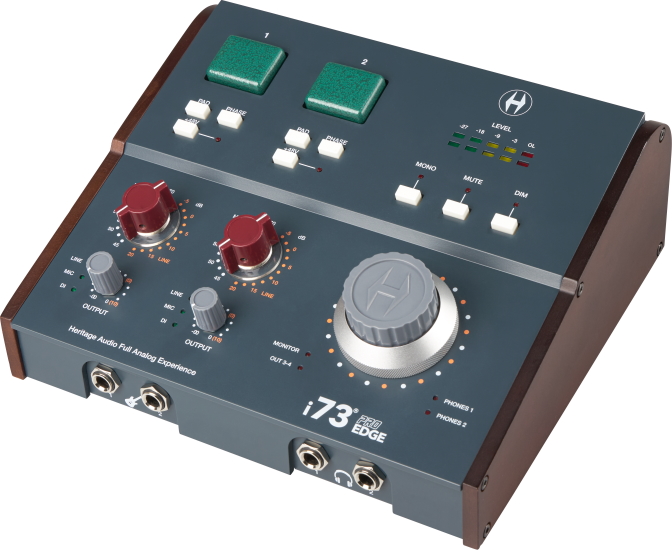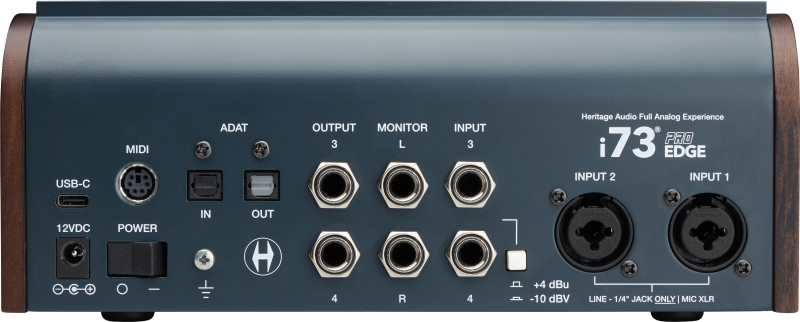Heritage Audio i73 PRO Family

European pro audio manufacturer Heritage Audio introduces its i73 PRO family offering varying I/O and features as the first-ever USB-C audio interfaces with built-in Class A 73-style preamps - presenting i73 PRO ONE as a 2-in/4-out USB-C-based desktop design with an integrated 73-style preamp, i73 PRO 2 as a 2-in/4-out USB-C-based desktop design with dual integrated 73-style preamps, and i73 PRO EDGE as a 12-in/16- out USB-C-based desktop design (digitally expandable by up to eight channels over ADAT) with dual integrated 73- style preamps - making the full-analogue experience of the ‘Golden Era’ of recording available to everyone, everywhere, and anywhere, as of January 22…
Readily representing easy entry into its two-years-in-the-making i73 PRO family of USB-C audio interfaces with built-in Class A 73-style preamps, Heritage Audio’s i73 PRO ONE aims to provide musicians, producers, and audio engineers with an easy pathway to the cherished analogue experience that has inspired music creation since the early Seventies. Since i73 PRO ONE offers the same Class A transformer-balanced circuitry found in the European pro audio manufacturer’s classic 73-style preamps, users will not only be able to capture signals with all that classic mojo and vibe but - for the first time - also achieve that straight from the audio interface itself into their computer. And, as is the case with any of Heritage Audio’s 73-style preamps, a three-way input is implemented so routing whatever connection the signal may be on - whether users want to track vocals through that hearty mic preamp with up to 70dB of gain, an electric guitar or bass through the fast, dynamic JEFT DI or the clean line inputs - to the DAW (Digital Audio Interface) with true studio quality is simplicity itself. Indeed, a low-latency monitoring mixing console has been developed from the ground up so users will always hear what they need to, either through the analogue stereo monitor output over TRS or stereo headphone output, each independently controlled by Heritage Audio’s mixer running inside the i73® PRO ONE itself. It is also possible to process tracks in realtime within that mixer with an ever-growing comprehensive set of tools modelled after Heritage Audio’s own outboard and private gear collection running internally over i73 PRO ONE’s DSP (Digital Signal Processor). Put it this way: it is possible to simultaneously record both dry and wet streams from Heritage Audio’s mixer to the DAW, and even insert third- party native plug-ins via said mixer’s aux channels! Class-leading AD/DA conversion, of course, comes naturally to i73® PRO ONE, with recording, mixing, and playback up to 24-bit/192kHz. Further features include +48V phantom power, PAD, and PHASE, plus MONO, MUTE, and DIM; USB-C computer connection (cable included), and MIDI (Mini-DIN in/out) connector, all housed in an attractive, classic European console-inspired desktop design.

It is worth noting here that all of the included plug-ins - namely, BritStrip (channel strip), HA 15 PRO (bass amp), Small Recording Amp Serial # C 17744, HA 1200 TapeSat, HA 240 Gold Foil Verb, and Heritage TAPEoPLEX, with a combined street value of up to €900.00 EUR/$900.00 USD - will also be made available to owners of any i73® PRO audio interface in native AAX/AU/VST3 formats, so once both streams are recorded into the DAW they can then use the dry track and easily recall the effect used with any of Heritage Audio’s plug-ins directly in the DAW during mixing.
Its increased footprint readily reflecting its increased I/O and features, i73 PRO 2 joins its smaller sibling as another 2-in/4-out USB-C audio interface, but benefits from the inclusion of two Class A 73-style preamps with up to 70dB gain for true studio-quality recordings. It is worth noting here that each of those preamps include independent +48V phantom power, PAD, and PHASE controls together with independent microphone/line inputs on combo XLR jacks, whereas i73 PRO ONE offers an extra line input on 1/4” jack only. On the face of it, then, this differentiates the two USB-C audio interfaces in question as all other functionality is identical, so purchasers can choose whatever device best suits their needs.
Needless to say, i73 PRO EDGE effectively represents the pinnacle of that two-year technological journey from ‘make-believe’ to must-have as a 12-in/ 16-out USB-C audio interface with dual integrated 73-style preamps, although admittedly when viewed from above it appears to be identical to its i73 PRO 2 sibling... well, almost - almost being the operative word here, for a quick glance at i73 PRO EDGE’s feature-packed back panel is all it takes to convince anyone that this audio interface is truly worthy of taking its rightful place at the head of the i73 PRO family feature-packed production table. By benefitting from two extra line inputs; two analogue stereo monitor outputs over TRS independently controlled by Heritage Audio’s mixer running inside the i73 PRO EDGE itself (with one mix per stereo out); two independent stereo headphone outputs (with dedicated cue mixes controlled by Heritage Audio’s mixer); and last, but by no means least, up to eight channels of expandability over ADAT, the Heritage Audio Full Analog Experience - as highlighted on each i73 PRO family member’s top panel as a tasteful reminder - offered by the top-tier i73 PRO EDGE evidently takes some beating.
But whether opting for the easy-entry i73 PRO ONE or the top-tier i73 PRO EDGE, make no mistake: the full-analogue experience of the ‘Golden Era’ of recording is, indeed, available to everyone, everywhere, and anywhere, thanks to Heritage Audio’s introduction of its i73 PRO family as the first-ever USB-C audio interfaces with built-in Class A 73-style preamps. Paying money and making choices has surely never been easier.
i73 PRO ONE, i73 PRO 2, and i73 PRO EDGE are shipping and available via Heritage Audio’s growing global network of dealers with a price in the EU of €649.00 EUR, €999.00 EUR, and €1,499.00 EUR, respectively, and a price of $649.00 USD, $999.00 USD, and $1,499.00 USD, respectively, US distribution being handled via RAD Distribution.
 How to resolve AdBlock issue?
How to resolve AdBlock issue?